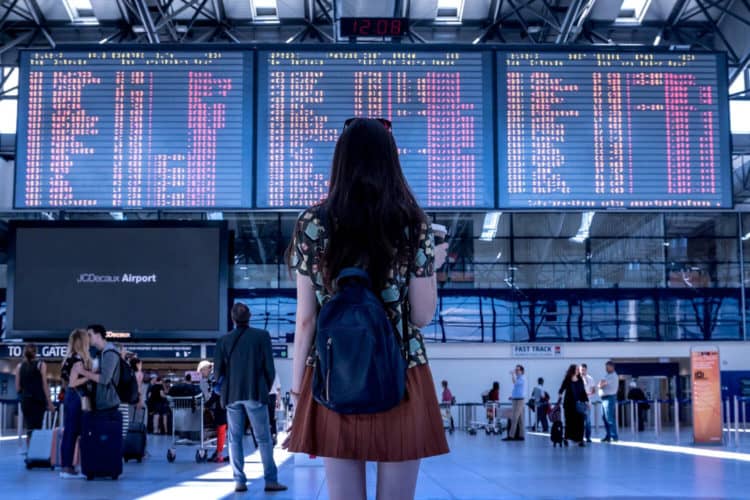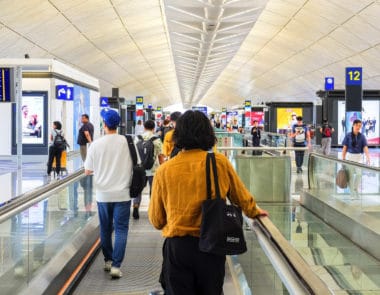Tips to Reduce Air Travel Stress, Fear, & Anxiety to Better Your Flight Experience
From navigating busy airports to the possibility of losing luggage, air traveling is an extremely stressful experience for many people. Whether you are planning a family vacation or are a regular business traveler, you probably have a few worries about your upcoming trip.
While it is not possible to reduce all travel-related anxiety, there are a few things you can do to ease your nerves before and during flying.
Table of Contents
Speed Through Customs and TSA Security Lines
Much of the stress from air travel comes from dealing with the TSA and going through customs. While neither can be entirely avoided, there are ways to make the process easier.
Further Reading: How to Quickly Get Through TSA Airport Security
Avoid The Normal Security Line With TSA PreCheck
From having to take your shoes off to waiting in long lines, the normal security line in airports is often the first part of a stressful flying experience. While the TSA may assign you PreCheck without being a member, it makes sense for you to join and almost guarantee access to the expedited security line. Read our complete TSA PreCheck guide or see a summary below.
- Requires Background Check, Approval, Fingerprinting and Interview
- Costs $78 for Five Years ($70 for Online Renewals)
- Reimbursement Included with Various Travel Credit Cards
- Shoes, Laptops, 3-1-1 Liquids, Belts, and Light Jackets Do Not Have To Be Removed
- Included With Global Entry
- Valid on Domestic and International Flights from Over 200 U.S. based Airports
- Not Valid Flying Internationally To The United States
- Eligible to U.S. citizens, U.S. lawful permanent residents, and U.S. Nationals
- Stack with CLEAR for an even faster experience
- Operated by the Transportation Security Administration (TSA)
Being a member of Global Entry (includes TSA PreCheck), I can attest to the stress relief that the expedited line offers. Having to take my shoes off, remove my bag of liquids, and place my laptop in a bin always made me anxious. I like removing as little as possible when going through security, and PreCheck takes one worry off my list before flying. I am usually through security in less than 5 minutes. This reduces my stress if I happen to arrive a little later than I wanted for my flight.
The Vacationer Tip
Use a travel-focused credit card to get reimbursed for the $78 ($70 for Online Renewals) TSA PreCheck application fee or the $100 Global Entry application fee. See the best credit cards for Global Entry and TSA PreCheck.
Use Global Entry to Expedite Customs Screenings When Entering the United States
If you have ever traveled internationally, you may know the anxiety that going through customs causes when returning to the United States. Long lines in a dreary and cold hallway are common, and it can be a confusing process for both first-timers and seasoned travelers. Signing up for Global Entry, run by the U.S. Customs and Border Protection (CBP), allows you to greatly expedite the process while also reducing the stress that comes with it.
- Requires Background Check, Approval, Fingerprinting and Interview
- $100 for Five Years
- Reimbursement Included with Various Travel Credit Cards
- Includes TSA PreCheck (use your PASSID or Known Traveler Number for Domestic Flights)
- Skip The Regular Line and Use Your Passport or United States Permanent Resident Card at the Global Entry Kiosks (available at more than 75 airports)
- Do Not Have to Fill Out a Paper Declaration Form (do it on the kiosk)
- Use Your Global Entry Card for Land and Sea Port Entry
- U.S. citizens, U.S. lawful permanent residents, and select foreign nationals eligible as well as individuals with passports from select foreign countries
If you plan on doing any international traveling, it makes sense to opt for Global Entry instead of TSA PreCheck. While the interview may be harder to schedule, the extra $22 for Global Entry to enjoy the benefits of both programs is worth it.
Further Reading: TSA PreCheck vs. Global Entry
Use CLEAR to Skip to the Front of the Security Line
There are two steps when going through airport security. The first is identity verification. This is the sometimes very long line you wait in to show the TSA agent your ID and boarding pass. The second step is the actual physical screening process. This is the part where you put your luggage on the belt and go through a body scanner. If you have PreCheck, you go through a metal detector and do not have to remove as much.
CLEAR helps to expedite the first step. Instead of showing your ID and boarding pass to the TSA agent, you simply use a CLEAR pod to verify your identity using biometrics (fingerprints and eye scan). After your identity is verified, a CLEAR employee takes you directly to the security screening area. If you have PreCheck, you will be taken to that screening area.
At $189/annually, CLEAR is not cheap, but the stress relief may be worth it. The good news is there are plenty of ways to save on the membership. See our complete CLEAR guide for details.
Use Mobile Passport as an Alternative to Global Entry
The mobile passport app allows you to expedite your way through customs using your smartphone. The freemium app lets you electronically submit your passport information and declarations upon arrival to the United States. Unlike Global Entry, it is free to use, but some time-saving features cost extra. See our Mobile Passport app guide for more details.
The Vacationer Tip
Even if you are already a Global Entry member, you should download the Mobile Passport app. You can choose which to use after landing based on which has a shorter line.
Get a Redress Number if Your Experience Frequent Security Issues
Some people have similar names to those on the watch list. Such travelers may experience delayed boarding and constant additional security screening, including frequently seeing SSSS on their boarding pass. Consider signing up for a Redress Number so the TSA can better identity you.
Be More Comfortable on the Airplane
Your seat location and boarding time can make a big difference on your overall flight experience. Board late and you may not get space in the overhead bin. Get stuck in a middle seat and and you may be uncomfortable for many hours on a long plane ride. Here are a few tips to reduce stress while on the plane.
Opt For Priority Boarding
If you have flown recently, you may have noticed people lined up at the gate well before the scheduled boarding time. While some people just want to get seated early, limited overhead bin space is the reason for the lines. Checked bag fees are higher than ever, and more travelers are opting to carry on their luggage.
Airplanes were not built for everyone to bring a carry-on suitcase, which creates the dilemma of very limited space. If you are in a later boarding group, you run the risk of completely full overhead bins by the time you board. If that happens, you may be forced to check your bag at the gate. This creates stress for two reasons. The first is you will have to wait for your bag to be brought up from the plane after the flight. The second is you will not have access to your bag in the overhead bin during the flight.
Sometimes there will be enough overhead bin space on your flight, but it may be behind you. If that happens, you will be forced to push your way to the back of the plane after landing to retrieve your carry-on luggage. Otherwise, you will have to wait for everyone else to deplane so you have a clear path to your bag.
Some airlines now allow you to pay extra for priority boarding. This allows you to board in an earlier group, which betters your odds of securing optimal overhead bin space. Frontier Airlines, for example, gives Zone 1 boarding to everyone who purchases a carry-on bag. American Airlines allows you to buy priority boarding as long as you are not flying basic economy.
Check with your airline to see if your fair includes priority boarding or if you are eligible to purchase it. Many credit cards, including Citi / AAdvantage® Platinum Select® World Elite™ Mastercard and Delta Reserve® Credit Card from American Express, include priority boarding as a perk.
Carry On Your Luggage
In addition to having to waste time at the baggage carousel at the end of a flight, many people also experience stress not having their luggage near them. While checked bags are usually sent to the right destination, airlines sometimes lose luggage (see our guide on What Should I Do If My Luggage is Delayed, Lost or Damaged by My Airline?). Most of the time it is temporary, but airlines have been known to permanently lose luggage.
Additionally, checked baggage-fees are going up. Airlines such as United Airlines charges $35 for the first checked bag and $45 for the second, according to USA Today. Bringing a carry-on bag has issues of its own, including finding overhead bin space, but it almost guarantees you will walk off the plane with your bag.
The Vacationer Tip
Consider priority boarding if you carry on your luggage. This will almost guarantee available overhead bin space near your seat.
Pay More For an Upgraded Seat
Like many people, I dislike being stuck in a middle seat. I also prefer sitting towards the front of the plane so I can quickly get off. Instead of playing Russian roulette and hoping the airline assigns me a great seat, I often pay extra to pick my seat.
An exit-row seat is a much cheaper alternative to sitting in first class. While you will not receive the same amenities, an exit-row seat will provide you with considerably more legroom than a standard seat. If possible, opt for an aisle seat to enjoy even more room. SeatGuru is an excellent resource to find the best seats on your upcoming flight.
Southwest Airlines has open seating, so you can pick the best seat available depending on when you board. Other airlines may charge as little as $10 to select your seat, but expect to pay more for better spots.
Further Reading: Best Seats on a Plane and Worst Seats on a Plane
Book Early and Arrive Early
For less stress and a better price, booking your flight early is better. Additionally, a non-stop flight and arriving early to the airport are two other important factors for a smooth traveling experience. Here are a few tips to keep in mind when booking your next flight.
Book a Non-Stop Flight
While flights with connections may be cheaper, short layovers can cause a great deal of stress. Delayed flights are not uncommon, and losing even 10 minutes can cause you to miss your connection. Even if your first flight is on time, the stress of attempting to get off the plane as soon as possible to catch your next flight can create a ton of anxiety. If you want peace of mind, pay a little extra, and opt for a non-stop flight.
Book Your Flight as Far Out as Possible
We understand the appeal of a last-minute trip, but you are much better off booking your flight at least three weeks in advance. According to a 2019 study done by CheapAir.com, the prime booking window is anywhere from four months to three weeks in advance. While you should still be able to get a great price by booking three weeks in advance, we recommend aiming for at least three months in advance. This will give you the best chance to grab the seat you want during your desired takeoff time.
Book an Early Flight to Avoid Long Delays and Cancellations
Flights can be delayed or canceled any time of the day, but you are likely to experience a shorter delay in the morning. According to FiveThirtyEight.com, a flight scheduled between 6 a.m. and 7 a.m. will experience the fewest delays, while anything up until around 9 a.m. is still a pretty good time to fly. If possible, book your flight in the early morning, ideally between 6 a.m. and 9 a.m.
Further Reading: How to Avoid Flight Delays & Cancellations and What to Do if Your Flight is Canceled or Delayed.
Arrive Early to the Airport
From traffic delays to longer than usual lines at airport security, it is possible to miss your flight if you do not leave early enough. While you may feel foolish breezing through security and having to wait two hours before your flight begins to board, it makes sense to give yourself extra leeway when deciding what time to leave your home for the airport.
Further Reading: How Early Should I Get to the Airport?
Do Not Overpack and Pack Early
My ideal traveling experience is having a single backpack that I can put under my seat on the plane. This avoids having to check my bag as well as having to fight for overhead bin space for my larger suitcase. While it is not always possible to pack light enough where a single backpack is enough, you can still keep your total bags to a minimum by only packing the essentials.
Some items that I avoid packing to conserve space include hardcover books, anything that may not get through TSA (think liquids larger than 3.4 ounces), large jackets (just wear it on the plane), your biggest/hardest pair of shoes (wear that pair on the plane), hairdryers, and an excessive amount of extra clothing. While it is important to have an extra pair of socks and underwear on hand, you should not blindly bring enough for 10 days if your trip is only for five days.
Also, you should pack as early as possible for your flight. Waiting until midnight the night before an 8 a.m. flight is never a good idea.
Further Reading: Travel Packing List and Beach Vacation Packing List
Consider Buying Travel Protection
According to ValuePenguin, the average cost of travel insurance is $148. Comprehensive policies cost more than basic policies, so what you buy will depend on your trip.
If you are traveling domestically in the United States, you probably do not need to purchase it. According to Transportation.gov, most airlines will simply rebook you on the next available flight if your flight is cancelled. Transportation.gov also notes most airlines will repair damaged luggage. If a repair is not possible, you will be paid a depreciated value as compensation. If the airline loses your luggage, they will likely pay you the depreciated value for it and everything in it (up to $3,500).
Before purchasing travel insurance, check if your credit card offers it. Two popular travel-focused credit cards, the Chase Sapphire Reserve® and Chase Sapphire Preferred® Card, both offer reimbursement for trip cancellation and interruption, baggage delays, lost luggage, emergency assistance, and accident insurance. Other popular credit cards, including the Bank of America® Premium Rewards® Card and Delta SkyMiles® Reserve American Express Card, offer similar insurance.
FAQ
No. TSA PreCheck and CLEAR actually complement each other well. Use CLEAR to skip the security line and TSA PreCheck for an expedited physical screening.
Yes, but it makes sense to have both available. Upon landing in the United States, simply use the service with the shortest line.
No. We only recommend paying for priority boarding if bin space is a concern of yours. Many airline credit cards offer free priority boarding as well.
If you are tall or just like spreading out your legs, exit-row seats are great for long flights. Depending on your flight and airline, the cost may be too much to justify, however.
The Vacationer’s Final Thoughts
While it is impossible to remove all air travel-related stress and anxiety, it can be reduced. Programs such as TSA PreCheck, Global Entry, CLEAR, and Mobile Passport, make going through security and customs a breeze. Booking an early flight as far out as possible will minimize cancellation odds. Boarding early and picking a comfortable seat can allow you to relax and store your luggage in an empty bin. Finally, consider travel protection if you are flying internationally or just want the additional peace of mind.
Featured Image by Emslichter via Pixabay
Get The Vacationer Newsletter
Get highlights of the most important news delivered to your email inbox







